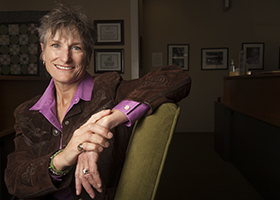Student distinction: Leah Morris
Health-policy executive returns to nursing roots at the UC Davis School of Nursing

Alumna Leah Morris
Leah Morris felt at a loss when her mother’s grave illness escalated. Although she was a nurse, she was unprepared as she and her father watched her mother slowly die. It was then that Morris, now an alumna of the Betty Irene Moore School of Nursing at UC Davis, decided to refocus her career and serve as a hospice provider to guide chronically ill patients and their families through the stages of dying.
“In the back of my mind I was always interested in hospice care,” Morris said. “Over the years, I supported my mom as she fought several chronic illnesses while I maintained a career in executive health-care administration. Eventually I realized I had lost the clinical connection to any one patient as well as the depth of care, skill or understanding needed. This is personal; it is the individual connection I wanted.”
At the time, Morris was working for a managed-care insurance company in an office setting. In her executive role, she managed staff at seven regional offices and was the administrator of more than 40 telehealth sites. Morris decided to return to school with the goal of connecting with individual patients again. Seeking to be part of a collaborative clinical team utilizing her nursing background, Morris enrolled in the nurse practitioner program at UC Davis. According to Morris, after a year of grueling studies, her interest in policy guided her to the Master of Science — Leadership program, where she became the first student to simultaneously complete both degrees.
While Morris was taking a new clinical path, she still felt passionate about public-health policy. Although a full-time student in two UC Davis programs, Morris joined the California Health Benefit Exchange, also known as Covered California, the state program to implement the Affordable Care Act. She started by reviewing and writing policy briefs to support the California implementation of health reform. In early 2013, she joined a team of colleagues to examine and score 33 health-plan bids to participate in California’s exchange. Ultimately, Morris and a physician colleague reviewed all the quality measures for each health plan. This led to the eventual selection of a dozen health plans offered in the recent statewide enrollment launch of Covered California.
“Depending on the day of the week, I may be in a white lab coat or a business suit,” Morris said.
Morris believes the School of Nursing fit her needs because the faculty created a program to integrate the leadership and policy elements of the master’s-degree program, with clinical nurse practitioner preparation. She and her faculty advisors tailored her educational needs to fulfill her goal of working in end-of-life care.
“My research is in an area I had personal experience with - training family members to care for an end-of-life hospice patient,” Morris said. “This is a project that touched my heart. I feel there is a real need for this type of care. The faculty at the School of Nursing mentored and encouraged me with extraordinary clarity, support and direction.”
According to Morris, this research allowed her to learn about the roles of each health-care provider in hospice care, especially that of a nurse practitioner. Additionally, she worked as a student with a local hospice program to gain clinical experience. Morris left her corporate role to engage as a full-time student with the generous support of the funding offered by the School of Nursing. Her education was also supported, in part, by the Pat and Charles Fullerton Pain Medicine Nursing Scholarship, which promotes the role of nurses and their growing impact in pain management.
“One of the major issues surrounding those who are dying is pain management,” Morris said. “This scholarship was a wonderful guiding light for me. It helped me focus on principles and research to help those in pain.”
In June of 2013, Morris graduated both the nurse practitioner program and the master’s-degree leadership program. Today, she continues to work at the California Health Benefit Exchange to create and implement programs that help the state’s millions of uninsured residents access quality health care through insurance. Morris also works part time at Yolo Hospice, where a nurse practitioner role was created for her. Here, she collaborates with an interprofessional team to meet the needs of each hospice patient. She conducts home visits to assess the patients’ clinical conditions and Medicare eligibility.
According to Morris, the additional UC Davis education helped her fulfill her goal of providing clinical care to dying patients as well as continuing to participate in state-level policy work to improve the public’s health.





